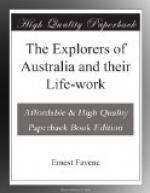On the 16th of December, Wells, accompanied by that veteran pioneer N. Buchanan, formerly of Queensland, started back with an Afghan, a native boy, and eight camels, to look for the two men, who he hoped had succeeded in finding Joanna Springs. He was absent until the 10th of January, 1897, when he was forced to return unsuccessful. At the beginning of April, taking with him his former companions of the expedition, Wells renewed the search, and on the 9th at last succeeded in identifying the Joanna Springs of Warburton. On the 13th some articles belonging to the lost men were found amongst the natives, but he did not at that time find the bodies. He started again with two members of the West Australia police force, Sub-Inspector Ord and Trooper Nicholson, and native trackers. This time they were successful in inducing some natives to guide them to the exact spot where the remains lay amongst the spinifex and sand. The bodies were within six miles of the place where, on the last search expedition, Wells had found articles of equipment with the natives.
G.L. Jones had kept a journal which supplied the clue to the cause of their death.
“He stated in his journal,” says Wells, “that they had gone west-north-west for five days after separating from the main party, then travelling a short distance north-east, and that both he and Charles felt the heat terribly and were both unwell. They then returned to the well (Separation Well) after an absence of nine days, rested at the water five days, and then started to follow our tracks northward. Afterwards one of their camels died, which obliged them to walk a great deal, and they became very weak and exhausted by the intense heat. When writing he says that two days previously he attempted to follow their camels, which had strayed, but after walking half-a-mile he felt too weak to proceed and returned with difficulty. There was at that time about two quarts of water remaining to them, and he did not think they could last long after that was finished.”
From the above extract from Wells’s Journal, it is evident that the unfortunate men lost their lives through a mistake in judgment in returning to Separation Well, the straying away of their camels, and the merciless rays of the desert sun.
The account of this, the first expedition to cross the great sandy desert from south to north, confirms in every particular Warburton’s experiences of the difficulties of exploration in that region. The intense heat of the sun, and its radiation from the red sand-ridges, the heat from both sky and earth, render it nearly impossible to travel during day, the only time when a man can perceive those slight indications which may eventually lead him to water. The traveller is therefore compelled to make night-stages, and frequently passes unheeding the very pool or well that would have saved his life. During the night not only are the natural physical features difficult to discern, but the birds, those water-guides of the desert, are sleeping.




